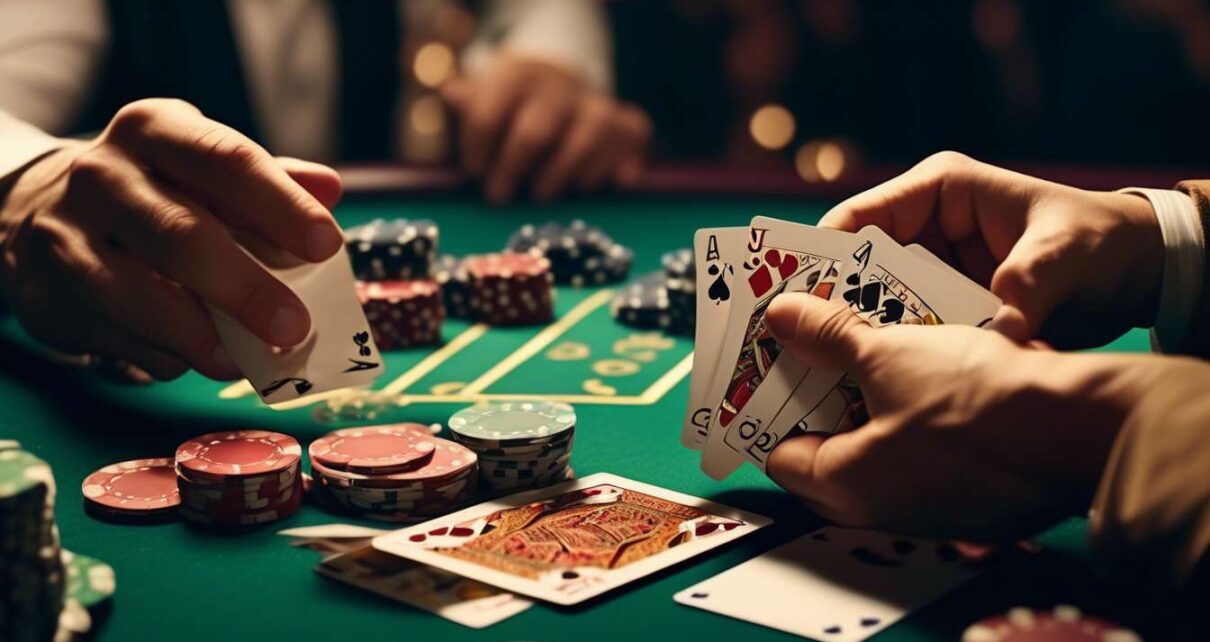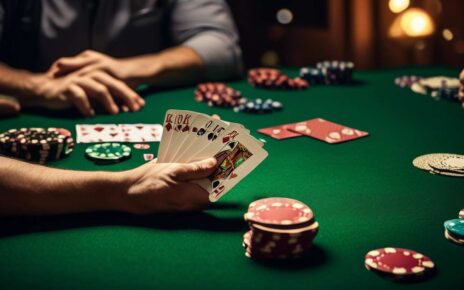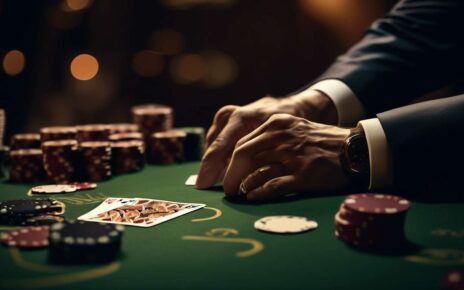When we first step into the enticing world of casinos, the allure of blackjack immediately captures our attention. It’s one of the most approachable and exciting games on the floor. Yet, like many beginners, we find ourselves hesitant, wondering about the best way to start. Together, we embark on this journey to master the basics of playing blackjack, aiming to transform our initial curiosity into competence.
In this article, we will explore the fundamental rules and strategies that form the backbone of the game. Our goal is to demystify the complexities and provide a solid foundation so that we all can confidently take a seat at the table.
By understanding key concepts such as:
- The value of cards
- The significance of the dealer’s upcard
- The art of the hit or stand decision
we will enhance our skills and enjoyment of the game.
Let’s delve in and conquer the basics together.
Understanding the Basics of Blackjack
Blackjack Basics
Blackjack, also known as 21, is a popular card game where the objective is to beat the dealer by having a hand value closest to 21 without going over. It’s a game that brings people together, offering friendly competition and the thrill of a shared experience. Learning how to play blackjack becomes a communal journey, filled with anticipation and excitement.
Game Setup
- Each player, including the dealer, receives two cards.
- The dealer has one card face up and one card face down.
Objective and Strategy
- The goal is to decide whether to "hit" (draw another card) or "stand" (keep the current hand) based on the hand’s total value.
Key Decisions
- Knowing when to hit or stand is crucial.
- Practicing together helps develop a sense of intuition and skill.
Shared Experience
As players gather around the table, they share strategies and support each other’s decisions. This camaraderie enhances the enjoyment of the game and helps build a foundation to appreciate this classic pastime.
Card Values and Hand Rankings
Understanding Card Values in Blackjack
In blackjack, the values of the cards are straightforward:
- Cards from 2 to 10 hold their face value.
- Face cards—Kings, Queens, and Jacks—are each worth 10 points.
- The Ace is versatile and can be valued at either 1 or 11, depending on which benefits the hand more.
Hand Rankings and Objectives
The primary goal in blackjack is to reach a hand value as close to 21 as possible without exceeding it.
- A hand with an Ace and a 10-point card is called a "blackjack" and is the strongest hand you can achieve.
- The excitement of the game comes from strategizing to reach or get close to 21 while considering the dealer’s visible card.
Strategizing and Social Interaction
Understanding these values and rankings helps players make informed decisions and enhances the overall experience.
- Knowing how to play blackjack is not just about the mechanics; it’s about sharing the excitement and camaraderie of the game with others at the table.
By mastering these basics, players can enjoy a more connected and engaging experience.
Dealer’s Upcard and Its Impact
The Dealer’s Upcard and Decision-Making in Blackjack
The dealer’s upcard plays a crucial role in influencing our decision-making process in blackjack, as it provides clues about their potential hand strength. Understanding the dealer’s upcard helps us feel part of a community of savvy players.
Strong Dealer Upcard (7 through Ace)
- When the dealer shows a strong card, like a 7 through Ace, they have a good chance of making a solid hand.
- In this scenario, we might choose to play more conservatively by:
- Standing on totals like 17 or higher.
Weak Dealer Upcard (2 through 6)
- Conversely, when the dealer’s upcard is weak, we can adopt a more aggressive strategy. Recognizing these scenarios enhances our confidence and bonds us with fellow players.
- Possible actions include:
- Doubling down.
- Hitting on a softer hand.
By adapting our strategies based on the dealer’s upcard, we not only enhance our blackjack skills but also deepen our sense of belonging in the blackjack community.
The Importance of Ace Management
Effectively managing aces in blackjack is crucial because they offer a flexible advantage, allowing us to switch between a high or low card to optimize our hand. Understanding ace management is like unlocking a hidden tool in our blackjack toolkit.
Key Benefits of Ace Management:
-
When we hold an ace, we have the power to adapt our strategy on the fly.
-
This adaptability connects us to a more seasoned group of players.
Unique Features of Aces:
-
Aces can be counted as either 1 or 11.
-
This dual value gives us the option to keep our hand safe or aggressive.
Strategic Considerations:
-
Consider the dealer’s upcard.
-
Evaluate your current total.
-
If your total is 17 with an ace as 11, you can shift it to 1 to avoid a bust.
By mastering ace management, we align ourselves with fellow players who understand how to play blackjack effectively, creating a sense of community and belonging at the table.
Mastering the Hit or Stand Decision
Deciding whether to hit or stand is a pivotal moment in blackjack that can significantly affect our chances of winning. As we gather around the table, we all share that familiar anticipation and camaraderie. Knowing how to play blackjack effectively means mastering this decision.
Basic Strategies:
-
When our hand totals between 12 and 16, and the dealer’s upcard is 7 or higher, it’s often wise to hit. This strategy minimizes the risk of the dealer winning with a higher hand.
-
Conversely, if our total is 17 or higher, standing is usually the best move, as the risk of busting outweighs potential gains.
Considering the Dealer’s Upcard:
- If the dealer is showing a 4, 5, or 6, standing on lower totals can be strategic, as the dealer is more likely to bust.
By understanding these nuances, we strengthen our collective gameplay and foster a sense of unity at the table.
Let’s continue honing our skills and making informed decisions together.
Doubling Down and Splitting Pairs
One of the most exciting strategic moves in blackjack is deciding when to double down or split pairs to maximize potential winnings.
Doubling Down
When we double down, we’re doubling our initial bet and committing to receiving just one more card. It’s a bold move that can significantly boost our winnings when done correctly. Typically, we double down when:
- We have a total of 10 or 11.
- The dealer shows a weaker card like a 5 or 6.
Splitting Pairs
Splitting pairs involves dividing our initial pair into two separate hands, each with its own bet. This strategy is best used in the following scenarios:
- We’re dealt a pair of Aces.
- Splitting Aces gives us a chance to land two strong hands.
- We’re dealt a pair of 8s.
- Splitting 8s helps us avoid a problematic total of 16.
By mastering these moves, we’re not just playing blackjack; we’re playing smart, together, as a community of savvy players.
Blackjack Etiquette and Tips
Mastering blackjack etiquette and tips can enhance our gaming experience and ensure we’re respectful players at the table. Knowing how to play blackjack isn’t just about strategy; it’s also about the social dynamics of the game.
Key Etiquette Tips:
-
Always wait for your turn and avoid touching the cards unless you’re explicitly allowed to do so.
-
Use hand signals clearly and confidently to communicate your decisions to the dealer.
Joining a table with a friendly attitude is crucial. Be ready to engage with fellow players and dealers, as this fosters a sense of community.
Effective Chip Management:
-
Stack your chips neatly.
-
Make clear, courteous bets.
-
Tip the dealer when you’ve had a good run to show appreciation and build rapport.
Finally, understanding and respecting the table limits ensures you’re playing within the game’s framework, contributing to a harmonious gaming environment.
Practice Strategies for Improvement
To sharpen our blackjack skills, it is important to regularly practice using various strategies that simulate real-game scenarios.
Home Game Practice:
- Set up a home game with friends.
- Take turns being the dealer.
- Use this opportunity to recognize patterns in card distribution.
- Hone decision-making skills in a comfortable environment.
- Build confidence and camaraderie with peers.
Online Simulators:
Utilizing online blackjack simulators offers several benefits:
- Access to a wide range of scenarios.
- Understanding different strategies and their real-time application.
- Tracking progress and identifying areas needing improvement.
- Receiving guidance similar to having a personal coach.
Community Engagement:
- Join a local blackjack club or online community.
- Share tips and experiences with fellow enthusiasts.
- Foster a sense of belonging and accelerate learning.
- Transform practice into successful blackjack sessions.
By engaging in these activities, we can effectively enhance our blackjack skills and enjoy the learning process.
What are the common myths about blackjack that beginners should be aware of?
Myth 1: Card Counting is Illegal or Cheating
One common misconception is that card counting is illegal or cheating.
- Reality: Card counting is a skill that some players use to gain an advantage. While casinos may not welcome card counters, it is not illegal.
Myth 2: You Need to Be a Math Genius to Play Well
Another myth is that you need to be a math genius to play blackjack well.
- Reality: Understanding the basics of the game is important, but you don’t need complex calculations to enjoy and succeed in blackjack.
By dispelling these myths, beginners can approach the game with a clearer mindset and focus on developing their skills.
How does the house edge affect a player’s long-term strategy in blackjack?
Understanding the House Edge in Blackjack
The house edge is a critical factor that impacts our long-term strategy in blackjack. It influences our decisions and overall profitability. By recognizing this factor, we can adjust our gameplay to maximize our chances of success.
Key Points:
-
Influence on Decisions: Understanding the house edge helps in making informed choices during each hand.
-
Strategic Gameplay: With this knowledge, we can play strategically, enhancing our overall performance at the blackjack table.
Grasping how the house edge works is essential. It empowers us to play smarter, making decisions that can lead to better outcomes over time.
Are there any popular variations of blackjack that beginners should try or avoid?
There are numerous popular variations of blackjack that beginners may encounter.
Some of these variations can add exciting twists to the classic game, while others may introduce more challenging rules that could be intimidating for newcomers.
It’s important to explore different versions of the game to find what suits your preferences and skill level.
By trying out various variations, you can enhance your understanding and enjoyment of the game.
Here are a few popular blackjack variations you might consider:
- Blackjack Switch: Allows players to swap the top cards between two hands.
- Spanish 21: Played with a deck that excludes the number 10 cards, offering different payout options.
- Pontoon: A British version with different terminology and rules, such as "Twist" instead of "Hit."
- Double Exposure Blackjack: Both dealer cards are dealt face-up, but the game has a different payout structure.
By exploring these variations, you can experience new challenges and excitement in your blackjack journey.
Conclusion
Congratulations! You’ve now mastered the basic strategies of playing blackjack.
By understanding key elements such as:
- Card values
- Dealer’s upcard impact
- Ace management
And making informed decisions on:
- Hitting or standing
- Doubling down
- Splitting pairs
You’re well on your way to becoming a confident player.
Remember to practice regularly and follow proper blackjack etiquette for a fulfilling gaming experience. Keep honing your skills and enjoy the thrill of the game!




